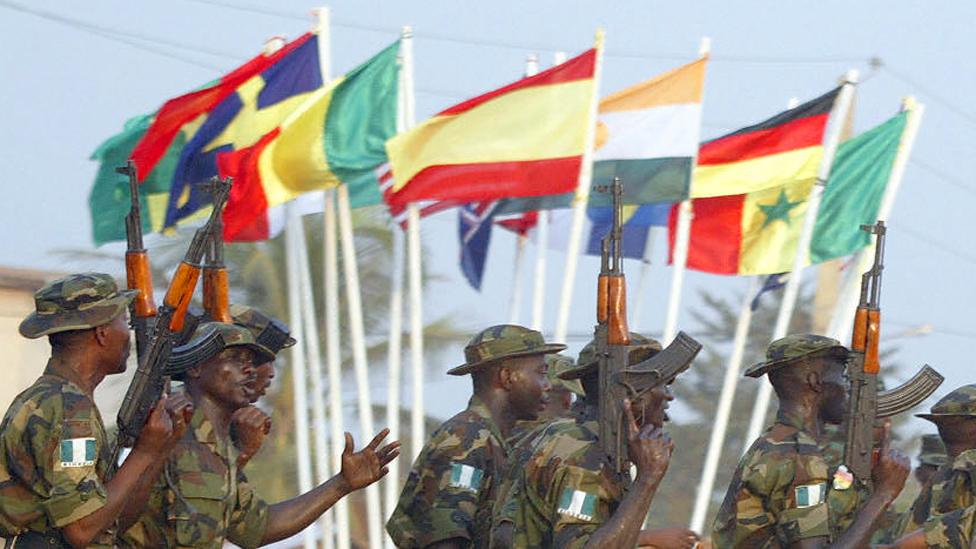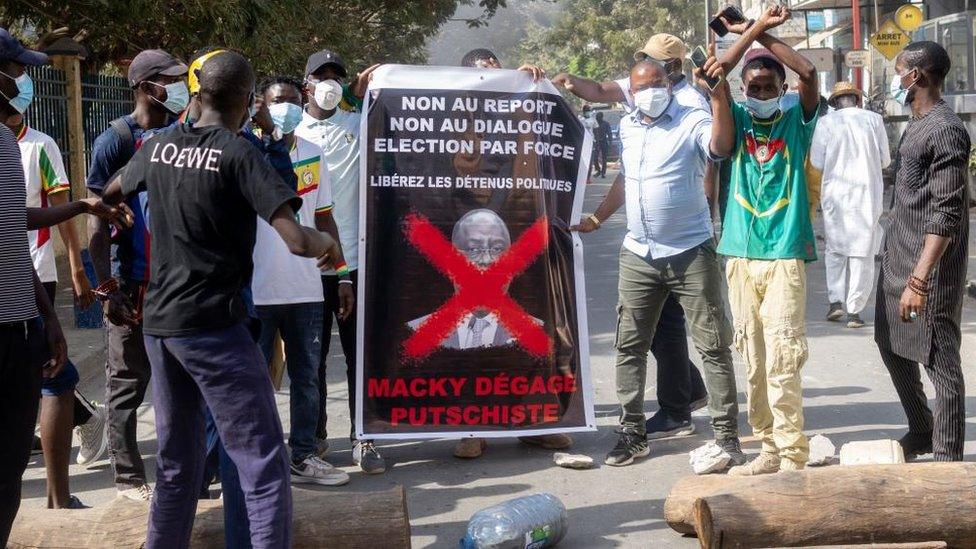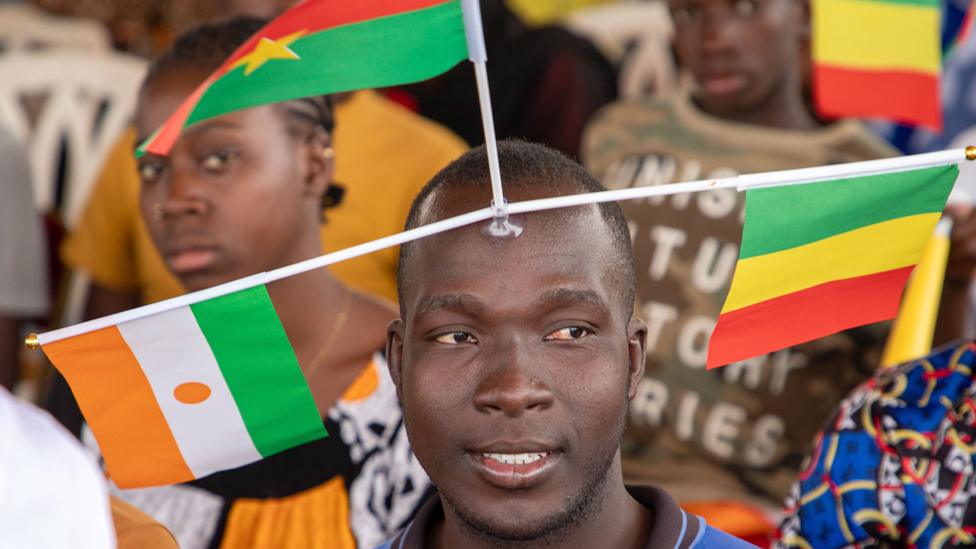Ecowas in crisis: Why West Africa's united front is in tatters
- Published

File photo of Nigerian soldiers dancing with their rifles around flags at the closing ceremony of joint military exercises in Benin
As West African ministers gathered in Nigeria's capital for yet another emergency meeting, they must have been wondering what further shocks could befall their region - its stability and political cohesion already tested to breaking-point.
The session of the mediation and security council of the Economic Community of West African States (Ecowas) had originally been summoned to discuss last month's announcement from the military juntas leading Burkina Faso, Mali and Niger of their intention to withdraw from the 15-member bloc "without delay".
But by the time they arrived in Abuja, the ministers found themselves confronted with an entirely new crisis added to their agenda - the decision of Senegal's head of state, Macky Sall, to postpone the 25 February presidential election.
On Monday, with gendarmes ejecting opposition members from the national assembly, his parliamentary supporters voted to push the polls back until 15 December.
This sparked a storm of protest from the opposition and civil society, with even the governing party's own candidate, Prime Minister Amadou Ba, opposed to a decision that shakes to its foundations a country that had hitherto been seen as one of West Africa's most resilient and institutionally rooted democracies.
Just when Ecowas' civilian-led member states most need to maintain a united front in defence of constitutional rule in the face of the military regimes that have swept across West Africa since 2020, one of the region's most high-profile democratically elected presidents has unilaterally changed the rules.
Mr Sall intends to extend his stay in power by nine months beyond the official 2 April handover date, in the possibly vain hope of boosting his camp's hopes of victory at the polls when he does eventually stand down.
Many wonder if his ultimate goal is a U-turn, abandoning his promise to stand down and instead running for a further term.

President Macky Sall's decision to delay elections in Senegal has sparked protests
Already Ecowas was struggling to sustain serious pressure on the military leaders of the Sahel region - who have bolstered their domestic support by painting the regional bloc as bullying neighbours in thrall to France, the former colonial power in much of the region.
The heavy-duty economic sanctions imposed previously on Mali and now on Niger, have hurt their populations - driving up prices as key import supplies are squeezed, hitting government finances, and putting the payment of salaries at risk.
But this has only generated popular resentment which has bolstered support for the military regimes, at least in the short term.
Soft diplomacy - mediation by Togo, which has kept friendly relations with the military regimes despite being an Ecowas state - looked like it might bring a breakthrough, with rumours of a draft agreement on a timetable for Niger's restoration of civilian rule, only for the country then to suddenly announce its departure from the bloc altogether.
Mali's transitional head of state, Colonel Assimi Goïta, did not even bother to suggest a new election schedule after abandoning his earlier promise to organise polls this month.
Instead his regime this week simply issued a new statement denouncing sanctions and reiterating its determination to walk out of the regional bloc.
One of the most awkward challenges for Ecowas as it tries to resist and reverse the tide of coups is the accusation of hypocrisy or double standards - that the bloc talks tough when soldiers seize power from civilians, but rarely speaks or acts with any force when elected civilian leaders stage "constitutional coups" and change or bend the rules to prolong their own stay in office - as happened in Guinea in 2020.
And that is not the only example. The previous year, Togo had passed constitutional amendments to allow President Faure Gnassingbé to stand for two more terms.
In neighbouring Benin all opposition parties were excluded from the legislative polls and then in 2021 two of the leading opposition contenders for the presidency were detained before the election and later sentenced to long jail terms.
Against the background of such manipulations and abuses by civilian-led governments, the Ecowas 2001 protocol on "democracy and good governance" risks reading like empty words.
Among the bloc's senior policymakers there has been a spreading recognition that this undermines its moral leverage and chances of mobilising public support for efforts to pressure coup leaders into restoring democracy.

Burkina Faso, Niger and Mali - which all face jihadist insurgencies - feel Ecowas is too deferential to France, a former colonial power
That is why its reaction to President Sall's postponement of the Senegalese election will be so critical.
After earlier attempts to agree a region-wide limit of only two presidential terms were blocked by some member governments, officials have been exploring other ways of toughening the rules to penalise or block constitutional manipulation.
But those changes have not yet been finalised or approved. So for now Ecowas civilian leaders have to work with tools that they have - of which peer-group pressure, traditionally a real strength of West African regional political culture, may be the strongest.
There have been successes.
Last month, George Weah, Liberia's incumbent president, handed over power to the opposition challenger Joseph Boakai, having gracefully accepted defeat at the polls.
And mediation by Ecowas persuaded the Sierra Leone government to allow former head of state Ernest Bai Koroma - who faced dubious accusations of links to a failed coup attempt - to leave for Nigeria on "medical grounds".
Yet in the case of larger or more influential countries, the bloc has generally lacked the diplomatic clout, and sometimes the political will, to enforce meaningful and consistent adherence to its proclaimed democratic governance standards.
Responding to the insistence of the Nigérien, Malian and Burkinabè regimes on pulling out of Ecowas, Thursday's ministerial meeting refrained from threats or further sanctions. It simply noted that the juntas had not consulted their citizens on this move and then made the positive case for staying in the bloc, to co-operate together in tackling common challenges like climate change, violent extremism, migration and organised crime.
However, this shift away from confrontation will probably not change the minds of the military leaders.
It marks an Ecowas recognition that restoring regional unity will have to be a long-term game, based on restoring goodwill and waiting for pressure from the ordinary citizens of the Sahel states - including the millions who live as long-term settled immigrants in coastal West African countries - to begin to make itself felt.
But this comes close to an admission that extending common democratic principles to the Sahel once more will have to wait for another day.
Tackling the urgent new threat to Senegal's democracy cannot be shelved or phased. The country is a cornerstone of Ecowas - and albeit with flaws, its political system is built on fundamental principles and institutions. The stakes are huge.
Much of the Senegalese political class and public are in uproar over the president's postponement of the election.
Numerous constitutional experts insist that President Sall and his parliamentary majority do not even have the legal power to change the date of the polls or extend the head of state's term beyond its previously scheduled end on 2 April.
And there is international pressure too: the US Senate Foreign Relations Committee, for example, has accused Mr Sall of putting his country "on a dangerous path towards dictatorship".
Against this background, if Ecowas retreats from clear defence of basic constitutional principles, opting instead for a soft stance towards an incumbent civilian leader who is "a member of the club", its already eroded credibility as a defender of any common democratic principles will be profoundly damaged in the eyes of many West Africans.
Paul Melly is a consulting fellow with the Africa Programme at Chatham House in London.